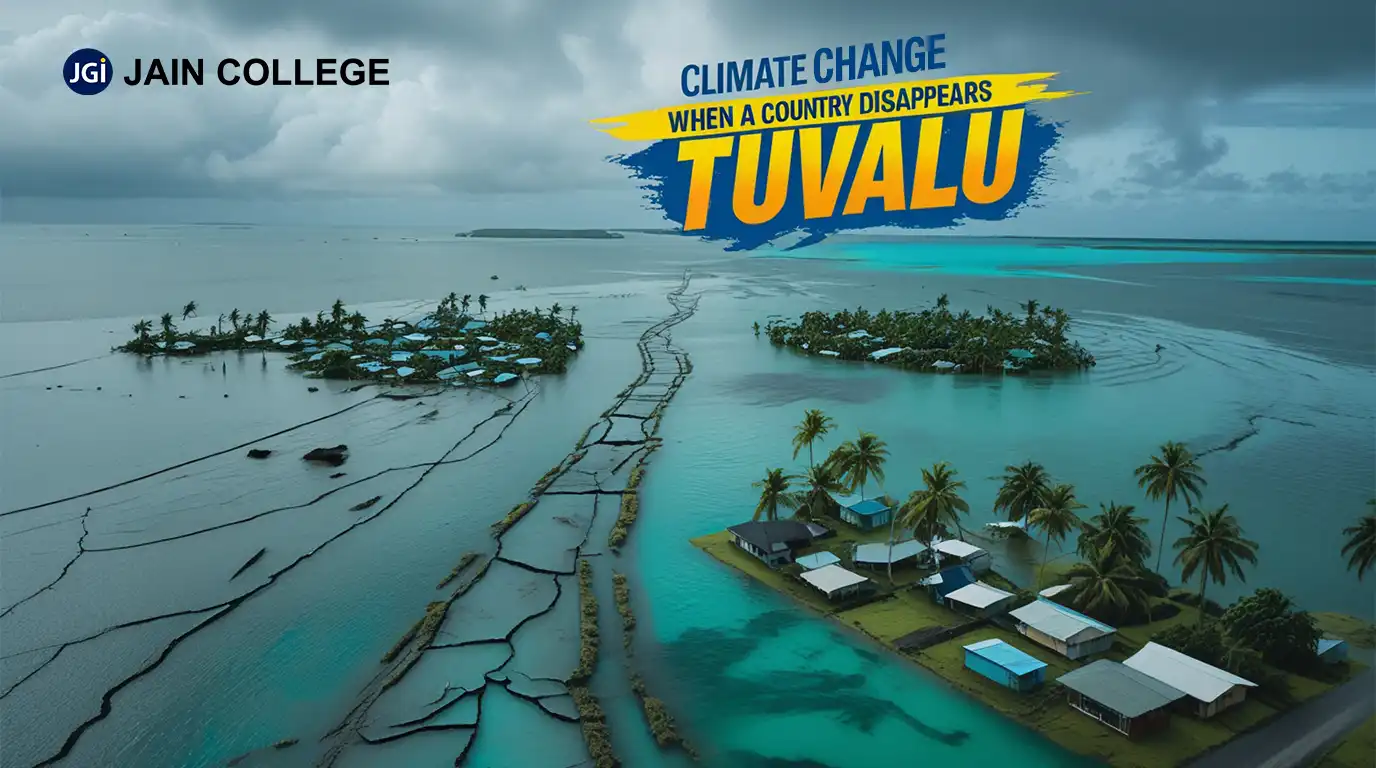
Imagine waking up to find that your homeland, the soil, the houses, the trees, and even the streets you grew up on may no longer exist. This isn’t a science fiction plot; it’s the reality for the people of Tuvalu, a small island nation in the Pacific Ocean.
Tuvalu’s story has become the world’s most powerful symbol of the dangers of climate change. Rising sea levels, unpredictable storms, and changing ecosystems are threatening to erase not only land but also culture, identity, and sovereignty. Tuvalu's plight serves as a warning to all of us: if climate change has the power to erase a country from the map, what does the future hold for the rest of the planet?
Before exploring Tuvalu’s plight, it’s important to understand what climate change actually means.
Climate change refers to long-term shifts in global temperatures and weather patterns. While the Earth’s climate has always fluctuated naturally, today’s rapid warming is overwhelmingly driven by human activities, including the burning of fossil fuels, deforestation, and industrial processes that release greenhouse gases such as carbon dioxide (CO₂) and methane.
Climate change results in increasingly violent weather, a warmer planet, and rising sea levels. Tuvalu sits right at the frontline of these threats.
Climate change is transforming the entire Earth, not just one country or region. Some of the most pressing consequences include:
For Tuvalu, these global challenges translate into an existential crisis.
Tuvalu is one of the smallest countries in the world, with a population of around 11,000 spread across nine low-lying islands. Its highest point is just 4.5 metres above sea level, making it extremely vulnerable to even minor rises in sea level.
Tuvalu is not just land; it is identity. Here, people have rich cultural traditions, strong community ties, and deep connections to their islands. However, their entire legacy is currently in danger of disappearing under the ocean's waves.
Rising Sea Levels – The Greatest Threat
The oceans are rising faster than expected, largely due to melting ice sheets in Greenland and Antarctica and the thermal expansion of seawater.
For Tuvalu, rising sea levels have an impact on:
The United Nations has already listed Tuvalu as one of the countries most at risk of becoming uninhabitable in this century.
The human face of climate change is starkly visible in Tuvalu. Families live with uncertainty: will their children inherit a homeland or a memory?
Impacts on Human Health include:
Tuvalu’s ecosystems are under siege:
Globally, climate change is pushing thousands of species towards extinction, reminding us of how fragile Earth’s web of life truly is.
Climate change is not only a humanitarian crisis; it’s also an economic one.
Worldwide, climate-related disasters already cost hundreds of billions of pounds each year. For Tuvalu, the economic impact is measured in destroyed homes, ruined farmland, and growing dependence on international aid. With limited natural resources and industries, Tuvalu simply cannot absorb the financial shocks of climate disasters.
Here lies the moral paradox: Tuvalu contributes almost nothing to global emissions, yet it bears one of the heaviest burdens of climate change.
Industrialised nations, which are responsible for most greenhouse gases, face growing pressure to provide financial and technological support. A key principle of climate justice is that those responsible for the problem must bear responsibility for its solution.
Tuvalu has been a strong voice in international climate negotiations. At the Paris Agreement (2015), Tuvalu and other small island nations pushed hard for limiting global warming to 1.5°C, recognising that even 2°C could doom their homelands.
Tuvalu also plays an active role in the Pacific Islands Forum and annual COP summits, persistently urging world leaders to act faster and more decisively.
Tuvalu isn’t waiting passively for its fate; it’s fighting back.
Technology offers a glimmer of hope:
Tuvalu is not an isolated case. Rising sea levels also pose a threat to major global cities like London, New York, Mumbai, Dhaka, and Miami. Tuvalu’s struggle is simply the first chapter of a much larger story that could engulf millions worldwide.
If we fail to save Tuvalu, we risk far more than losing one country; we risk losing entire coastlines, economies, and ways of life across the globe.
You may be surprised to learn that one person can make a significant impact.
Every action counts. When billions act, the collective impact is monumental.
Tuvalu’s story is not just about one nation’s fight for survival. It is a mirror reflecting humanity’s future. Climate change is not a distant threat; it is here, now, reshaping lives and landscapes.
If Tuvalu disappears, it will represent not just the country's loss but also humanity's failure to protect its planet. But if we act boldly, cutting emissions, supporting vulnerable nations, and embracing sustainable solutions, Tuvalu’s struggle could instead become the spark that saves us all.
The time for action isn’t tomorrow. It’s today.

JAIN PU College, a part of the renowned JGI Group, is committed to empowering students with quality education.
Beyond academics, the college ensures its online content reflects the same standard of excellence. Every blog and article is meticulously vetted and proofread by subject matter experts to ensure accuracy, relevance, and clarity. From insightful educational topics to engaging discussions, JAIN PU College's content is crafted to inform, inspire, and add value to its readers, reflecting the institution's commitment to intellectual growth and innovation.
View all Blogs